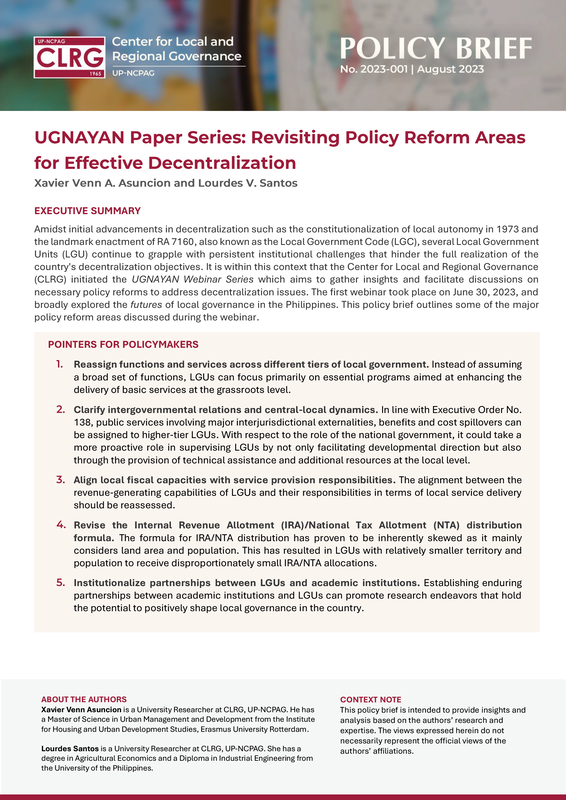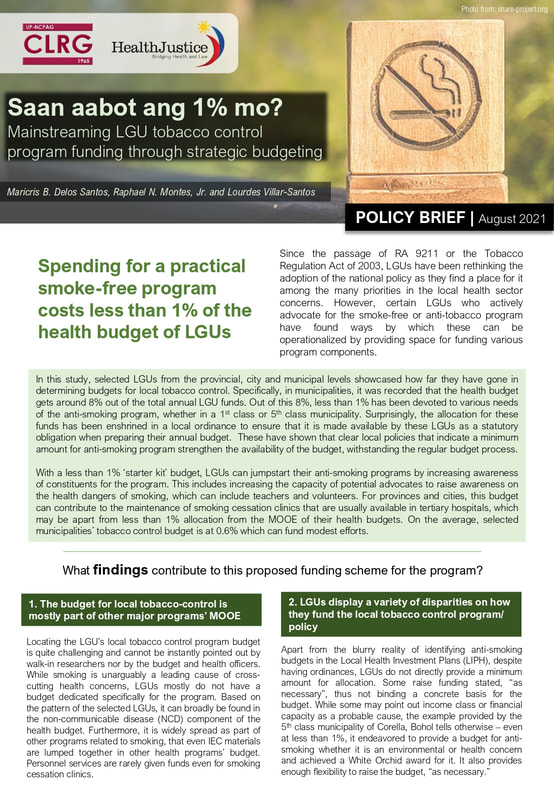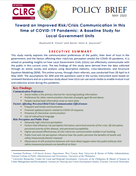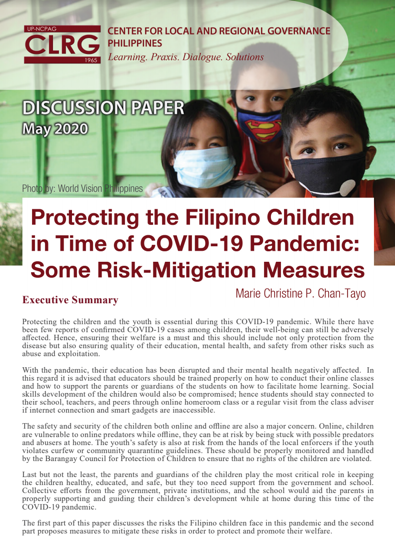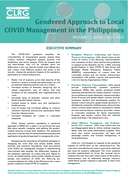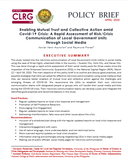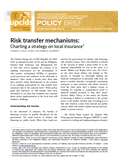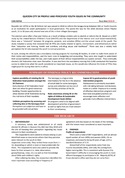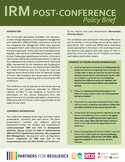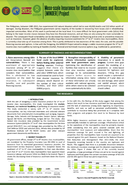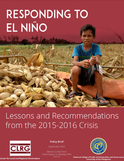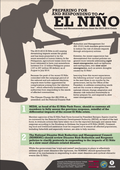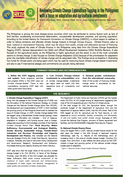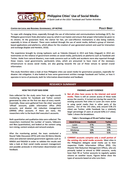|
Ugnayan Paper Series: Revisiting Policy Reform Areas for Effective Decentralization
[Xavier Venn A. Asuncion and Lourdes P. Villar-Santos] Amidst initial advancements in decentralization such as the constitutionalization of local autonomy in 1973 and the landmark enactment of RA 7160, also known as the Local Government Code (LGC), several Local Government Units (LGU) continue to grapple with persistent institutional challenges that hinder the full realization of the country's decentralization objectives. It is within this context that the Center for Local and Regional Governance (CLRG) initiated the UGNAYAN Webinar Series which aims to gather insights and facilitate discussions on necessary policy reforms to address decentralization issues. The first webinar took place on June 30, 2023, and broadly explored the futures of local governance in the Philippines. This policy brief outlines some of the major policy reform areas discussed during the webinar. Download full Mainstreaming LGU Tobacco Control Program Funding through Strategic Budgeting (August 2021)
[Maricris B. Delos Santos, Raphael N. Montes, Jr., and Lourdes P. Villar-Santos] In this study, selected LGUs from the provincial, city and municipal levels showcased how far they have gone in determining budgets for local tobacco control. As part of the international direction towards promoting smoke-free environments, LGUs have made their own initiatives and are encouraged to start taking action. Surprisingly, for some LGUs, the allocation for these activities has been enshrined in a local ordinance to ensure that it is made available by these LGUs as a statutory obligation when preparing their annual budget. The study also proposes 1% of the annual local health budget or local investment plan for health (LIPH) and starter kit which indicates PPAs it can cover. Download full |
|
Toward an Improved Risk/Crisis Communication in this time of COVID-19 Pandemic: A Baseline Study for Local Government Units
[Reymund B. Flores and Xavier Venn A. Asuncion] This study mainly explores the communication preferences of the public; their level of trust in the government; and the factors affecting their risk/crisis perception amidst the COVID-19 pandemic. It is aimed at providing insights on how Local Government Units (LGUs) can effectively communicate with the public in this current crisis. Download Full |
|
Protecting the Filipino Children in Time of COVID-19 Pandemic: Some Risk-Mitigation Measures
[Marie Christine P. Chan-Tayo] Protecting the children and the youth is essential during this COVID-19 pandemic. While there have been few reports of confirmed COVID-19 cases among children, their well-being can still be adversely affected. Hence, ensuring their welfare is a must and this should include not only protection from the disease but also ensuring quality of their education, mental health, and safety from other risks such as abuse and exploitation. Download Full |
|
Gendered Approach to Local COVID Management in the Philippines
[Michelle C. Castillo] The COVID-2019 pandemic amplifies the vulnerabilities of marginalized groups, among them women, children, indigenous peoples, persons with disabilities, and senior citizens. While the disease does not discriminate who will be infected, there are differences in the way that the health crisis affects men and women from different sectors and areas in the country. Download Full |
|
Enabling Mutual Trust and Collective Action amid Covid-19 Crisis:
A Rapid Assessment of Risk/Crisis Communication of Local Government Units through Social Media [Xavier Venn A. Asuncion and Reymund B. Flores] This study looked into the risk/crisis communication of Local Government Units (LGUs) in social media using the case of three highly urbanized cities in the country – Quezon City, Iloilo City, and Davao City. This was done through a rapid online assessment of their social media posts for three weeks since the imposition of the Enhanced Community Quarantine (ECQ) in the National Capital Region (NCR), March 12 – April 04, 2020. Download Full |
|
Risk Transfer Mechanisms: Charting a Strategy on Local Insurance [Dennis Dela Torre and Erwin Alampay]
This policy brief is based on the authors’ paper of the same title which is part of the research project “A Study on the Implications of Federalism in the National Capital Region and Considerations for Forming the Federal Administrative Region” of the University of the Philippines Center for Integrative and Development Studies (UP CIDS), the Department of the Interior and Local Government– National Capital Region (DILG–NCR), and the Local Government of Quezon City. The project is funded by the DILG–NCR. Download Full |
|
Quezon City SK Profile and Perceived Youth Issues in the Community
Republic Act 10742 or the SK Reform Act was passed in 2016 to reform the Sangguniang Kabataan (SK) or Youth Councils as an institution for youth participation in local governance. This paved the way for the 2018 elections where Filipino youth, 15 to 30 years old, elected new sets of SKs in their villages (barangay). Download full |
|
Integrated Risk Management Post-Conference Policy Brief
The triumvirate approaches of disaster risk reduction, climate change adaptation, and ecosystems management and restoration (DRR-CCA-EMR), collectively known as the Integrated Risk Management (IRM), have required local government units (LGUs) to be at the forefront of the planning process. While LGUs have embraced these big tasks, their ability to undertake such has been limited by their inadequate capacities and confusion in the use of various planning..... Download full |
|
Meso-scale Insurance for Disaster Readiness and Recovery (MINDER) Project
The Philippines, between 1985-2015, has experienced 410 natural disasters which led to over 40,000 deaths and $23 billion worth of damages. During disasters, the Philippine government carries majority of the burden in recovering from losses and in rehabilitating impacted communities. Most of this work is performed at the local level. It is more difficult for local government units (LGUs) that belong to the lower income classes because they have less financial resources, and yet they are also among the more vulnerable to disaster. Download full |
|
Responding to El Niño: Lessons and Recommendations from the 2015-2016 Crisis (long version)
El Niño has caused a global crisis that has put 18 million people all over the world in need of urgent assistance, while up to 50 million are facing hunger, disease and water shortage if left without support. Humanitarian aid ranging from food assistance, health and livelihood support are urgent interventions that must be implemented within three to six months and beyond, while livelihood recovery, food security and poverty alleviation measures for long term actions must be done to address the full impact of El Niño. Download full |
|
Preparing for and Responding to El Niño: Lessons and Recommendations from the 2015-2016 Crisis (short version)
The 2015-2016 El Niño is still causing devastating impacts across the globe and has been projected to be the worst recorded in human history. In the Philippines, agricultural losses alone has been estimated to have cost somewhere between 5 to 12 billion Philippine pesos (107 to 257 million US dollars) as of August to July 2016. Download full |
|
Reviewing Climate Change Expenditure Tagging in the Philippines with a focus on adaptation and agricultural investments
The Philippines is among the most disaster-prone countries which may be attributed to various factors such as lack of land barriers, accelerating environmental deterioration, unsustainable development practices, and growing population. According to the United Nations for Framework Convention on Climate Change (UNFCCC), a critical aspect to address in order to reduce emissions and alleviate climate change impacts is through Climate Finance. Download full |
|
Philippines Cities' Use of Social Media: A Quick Look at the LGUs' Facebook and Twitter Activities
To cope with changing times, especially through the use of information and communications technology (ICT), the Philippine government finds alternative ways by which it can hasten and ensure that proper information be given to its citizens. At the grassroots level, the clamor for fast, yet cost-effective mechanisms is also being realized, especially in times of disaster. Download full |



